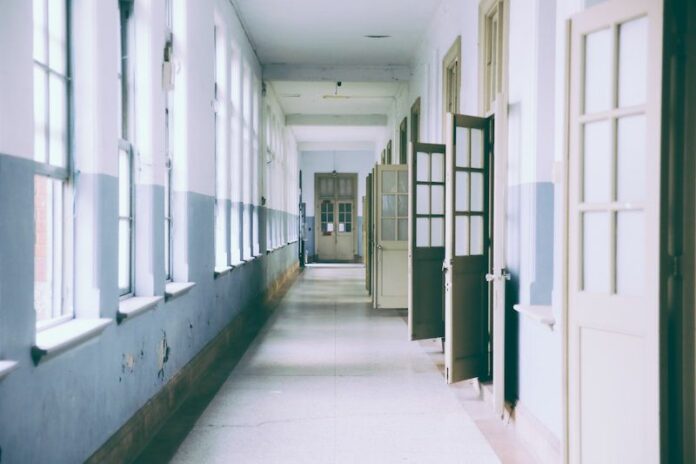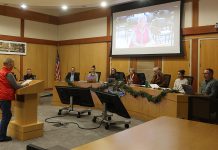School districts are beginning to notify families and meet with county educators as progress reports show concerning downward trends in student grades.
It started with a letter to families in the Windsor Unified School District, from superintendent Jeremy Decker. The letter outlines concerns being voiced from teachers that middle and high school students are showing a higher than normal number of D and F grades halfway through the first semester.
“Our first grading period is ending, and we are receiving information about grades, engagement and well-being, and we have some serious concerns,” said Decker in the letter.
Decker then outlined what the district currently knows.
“We have a substantial increase in the number of D and F grades on progress reports when compared with the same progress report grades last year,” he said. “Because California students were ‘held harmless’ for grades when everyone switched to distance learning in the spring semester, this is our first opportunity to recognize this challenge. Our district is not alone. Middle and high school districts throughout Sonoma County are reporting the same thing.”
Cloverdale’s superintendent Betha MacClain is seeing the issues too and feels the first priority is narrowing down the cause.
“I would say, based on the conversations I’ve had with other administrators and other superintendents, it is consistent across the county. It’s like a four-time increase in Ds and Fs,” she said. “There are a couple of different ways you can think about it. Is it a wake-up call to kids? Is it a question of grading practices? The pendulum swung so far from last spring to the fall … teachers heard the community outcry regarding rigor and accountability and ‘it can’t be the same as spring,’ so I’m also hearing feedback about the quantity of work. I believe that it’s an overcorrection, but I also think (there is an) issue of students thinking and hoping and expecting that there’s going to be a pendulum swing back to hold harmless and if they wait long enough, it’ll switch back.”
“I think there are a variety of things and what we’re trying to do is drill down and figure out, ‘Is it this? Is it this? Is it this?’” she concluded.
Decker’s letter also points out the myriad of traumas facing students in Sonoma County over the last few years, but also confirms that the state’s “hold harmless” mandate has been rescinded.
“In our current educational system, grades do matter,” Decker said, adding, “Distance learning is our reality right now.”
During a school board meeting on Oct. 14, the West Sonoma County Union High School District mentioned seeing similar trends in student grades. During principal reports, Laguna High School Principal Allie Greene said that 25% of kids weren’t passing at least one class at some point in the semester.
“There is a countywide effort to examine our distance learning practices so that we don’t get to the semester and have crazy D and F rates. There’s a countywide conversation going on,” said MacClain.
SCOE’s view
The Sonoma County Office of Education (SCOE) has been informed of the findings and convened a meeting with superintendents from around the county reporting similar issues.
“SCOE was approached last week by a group of high school district superintendents who were concerned about trends that they were seeing during this first quarter of distance learning, particularly among high school students,” said SCOE Director of Communications Jaime Hansen. “Grades were a ‘canary in the coalmine,’ but districts are also concerned about student engagement and well-being and teacher well-being.
“Since then, we have met with all high school superintendents to better understand these very difficult issues and how best to address them. SCOE does not normally have access to data about grades, so we are working with districts now to collect county-wide data and see how widespread these issues are,” Hansen continued. “We just sent out a survey, so we will not have data to share (right away). We have asked for information about the number of high school students receiving F’s, as this is the primary grading concern identified by superintendents. While we don’t yet have firm data, anecdotally, grades are a serious concern across many of the county’s high school districts.”
According to Hanson, SCOE will be working with all of its stakeholders to “identify and address the primary challenges that students, and staff, are facing during this unprecedented situation.”
Because the potential of failing grades has created a “call to action” to address concerns, “SCOE will be hosting a convening with school district leaders and teacher representatives, counselor, and others later this month, with the goal of coming together to understand the problem, identify bright spots that educators might be able to build on, and develop short-term and long-term solutions to the challenges children, families and teachers are facing. The first date is tentatively set for Oct. 27,” said Hansen.
What to know
Decker’s letter outlines what parents should know now, as well as what the WUSD is doing.
“Semester grades are the official grades on a transcript, so there is still time to bring up grades before the end of the semester in December,” Decker’s letter told Windsor parents. “Lower grades that continue until the end of the semester will impact eligibility for sports and other extracurricular activities, grade-related awards and scholarships and class rankings. If your students have received one or more D or F grades, please contact the teacher of the class to find out what happened.”
He also recommended that families listen to students describe their distance learning experiences and the reason for their lower grades and also contact the student’s counselor to set up a meeting.
Decker’s letter goes on to say the district is committed to rethinking distance learning so that it works better and stops “forcing a round peg into a square hole.” The district has been meeting with various school sites to discuss potential changes to schedules, grading practices and instructional strategies.
One of the plans that came out of those meetings is that there will be two upcoming school days that will be converted to entirely asynchronous to “allow teachers time to review student progress report data, and work within their teams to develop possible modifications to schedules, grading practices and instructional strategies.”
MacClain pointed out the importance of protecting and helping teachers who are struggling with distance learning too.
“We’re trying to really ride the gas pedal in a way that doesn’t overwhelm teachers, because teachers are exhausted,” she said. “Trying to find the balance between continuing to talk about changing our practices when teachers feel like, ‘Oh my god, I just changed my practice. I just overhauled everything, and now you’re telling me to do it again,’ I’m really concerned about that.
“In a larger district like Santa Rosa when you have a larger economy of scale — even in Windsor — where it is much easier to distribute the workload and create a subcommittee that’s going to look at those questions and find the best practices. In Cloverdale, we’re small, so I’m really trying to be cognizant of how teachers are feeling,” she finished.
But MacClain also thinks that evolution is inevitable. “Finding the model that really works, which may be much more flipped than what we’re doing now — meaning, less synchronous, more independent work and a different design of content delivery so that teachers are maybe working ore individually with students, their synchronous instruction is maybe more small group, more targeted — there are so many things we’re trying to figure out while we’re also flying the airplane,” she said.
She noted that Cloverdale parents will likely see correspondence about grades come out in the next week.
The COVID reality
At the end of the day, though most educators agree distance learning isn’t ideal, as long as Sonoma County continues to remain in the purple tier, there will be nothing local districts can do to return to in-person instruction.
“We know that most students, families and teachers would prefer that we were allowed to conduct instruction in person,” Decker said. “Unfortunately, Sonoma County continues to reside in the purple tier, and is lagging behind the other counties surrounding us. Therefore, we are not allowed to open for in-person instruction. Instead, we need to focus on how to make distance learning as successful as possible, and not focus on the politics surrounding COVID-19, schools reopening, wearing masks, etc.”
“We really don’t want to see students failing, because the stakes are really high,” said MacClain. “We have kids who should be graduating in June, we have kids in high school who have critical graduation requirements to complete. We have kids on the other end who are trying to learn how to read. There is no simple answer to this.
“The one thing that I will say is that (this problem is) countywide, it’s not statewide. I have a good friend who works in Marin and the one model that seems to be yielding better results … is the condensed schedule with fewer subjects at once. In other words, you would do three classes one semester and three the second semester,” she continued. “For instance, Novato is doing that. They have high school kids in three or four classes and then next semester they’ll do that. They get a year’s credit for that one semester class, so it’s sort of like a junior college class. That model seems to be yielding better results in the distance learning context. Novato is seeing pretty consistent grades. At the same time, Novato’s middle schools did not adopt that model and they do see the D and F rate escalate.”
Decker believes all stakeholders have a role to play in making a less than ideal circumstance as workable as possible.
“As a school district, we will prioritize learning that is meaningful to students and connects them to their peers, teachers and community. We will rethink grading and assessments so that they will also have meaning as markers of progress and not ends unto themselves,” his letter concludes. “As families, we ask that you continue to check in with your children about their schoolwork. Do not assume that everything is ok simply because students are online attending their Zoom meetings with their teachers.
“As students, we ask that you commit yourselves to doing the best that you can. If you are struggling to focus, understand concepts or maintain a positive outlook, reach out to your teacher or counselor … don’t wait until an invitation is extended to you by an adult. Take charge of your learning.”









